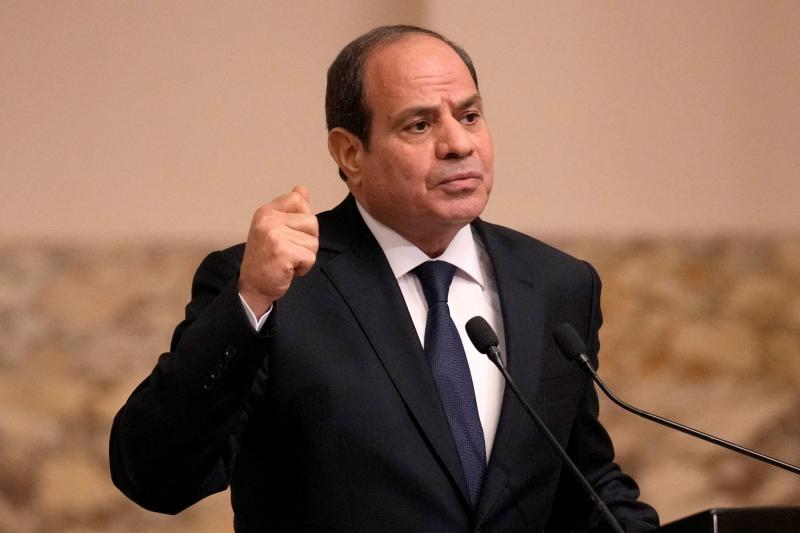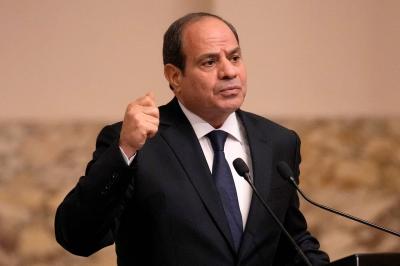Egyptian President Abdel Fattah el-Sisi, a former military leader, is expected to secure a third presidential term in elections set to begin on December 10, dominated by the war in neighboring Gaza and a struggling economy. This comes a decade after the ousting of Egypt's first democratically elected president. Sisi has focused his attention on mega-projects and state-led development plans, with the main project being the New Administrative Capital, costing $58 billion and located in the desert east of Cairo, which Sisi claims symbolizes the birth of a new republic. He stated, "We did not abandon Cairo, Alexandria, Port Said, or other provinces. We are moving forward in both the old and the new together."
Regarding security and stability, Sisi asserts that there are no political prisoners in Egypt and emphasizes the state's efforts to provide social rights for citizens, such as housing and jobs.
### Crackdown on the Muslim Brotherhood
In 2013, while Sisi was leading the armed forces and effectively ruling the country, hundreds were killed during the security forces' crackdown on a pro-Morsi sit-in in Cairo's Rabaa al-Adawiya Square. Egyptian officials claimed some protesters were armed. After Mohamed Morsi's ouster, Brotherhood leaders were arrested, and Sisi suppressed the movement, which he labels a terrorist group.
The Muslim Brotherhood denies any association with violence, stating that it sought power through democratic means. Established a century ago, it is one of the most influential Islamic organizations in the world, blending religious teachings with political activism and social welfare programs. Rabaa Square effectively no longer exists, as one of the many new bridges built during Sisi's tenure runs directly through the area. Furthermore, Tahrir Square, the symbolic heart of the 2011 uprising, has also undergone modernization that critics say aims to erase the memory of the pro-democracy revolution.
Before the 2018 elections, Sisi warned that "brute force" would be used against anyone threatening Egypt's stability, asserting, "I would die before anyone plays with its security." He added that the army's neutrality during the 2011 revolution that led to Mubarak's ousting would not be repeated. Mohamed Beltagy, a Muslim Brotherhood leader, recounted his encounter with Sisi one night in Tahrir Square in 2011, where Sisi introduced himself as "General Abdel Fattah, Intelligence."
### Major Projects
After consolidating power following Morsi's ousting, Sisi implemented reforms backed by the International Monetary Fund that have garnered praise from many economists. By improving the country's deteriorating infrastructure, Sisi aims to stimulate the economy and create jobs after decades of rapid population growth and unplanned construction. Some of the state-supported mega-construction projects include the expansion of the Suez Canal, agricultural initiatives, and a vast network of roads and bridges extending from east Cairo, which Sisi frequently inspects.
However, some economists point to the ongoing lack of decent job opportunities for youth, increasing debt burdens, and the military's tightening grip on key economic assets.
### Population Growth Concerns
The Egyptian president has expressed concern about the country’s population growth. In a conversation with a woman in 2022, he remarked, “You have six [children] and cannot manage; I have 100 million.” Sisi is the latest in a series of military-affiliated Egyptian presidents. Upon taking office in 2014, he sought to correct course by holding early morning meetings with the cabinet and participating in a cycling race during his first weekend as president, clearly signaling that the new president would get things done.
### Connection to the Poor?
Residents of the old Cairo neighborhood where Sisi was born on November 19, 1954, describe him as having exceptional discipline as a boy. While others his age played soccer or smoked, Sisi and his friends lifted weights made from stones and metal pipes. Neighbors and relatives note that he comes from a close-knit, religious family and memorized the Quran. He lived in a small apartment on the roof of an old building owned by his extended family. Though the family was relatively well-off, Sisi sought to demonstrate his connection to the struggles faced by ordinary Egyptians.
Morsi appointed Sisi as army chief and defense minister in August 2012, believing the military would allow the Brotherhood to implement its agenda as long as it protected military privileges. Following the Brotherhood's missteps in power and public outcry for Morsi's resignation, Sisi announced the end of Morsi's presidency on July 3, 2013, promising elections, which he won by a landslide the following year.
Sisi portrays himself as a straightforward figure, lacking the charisma and oratory skills of former presidents Gamal Abdel Nasser and Anwar Sadat. He appears at public events surrounded by ministers and military leaders, delivering long, impromptu statements in colloquial language while seated and demanding officials meet deadlines.
Internationally, Sisi has forged new relationships in Africa, aligning with China and Russia, as well as with Gulf Arab states that have pumped billions of dollars into Egypt to cushion economic shocks, before adopting a more cautious approach. Relations with the United States, a primary source of military aid, have fluctuated with changing politics in Washington. Former President Donald Trump referred to Sisi as his "favorite dictator." The administration of Trump's successor, Joe Biden, criticized Sisi's human rights record before enhancing cooperation regarding the conflict in Gaza.




